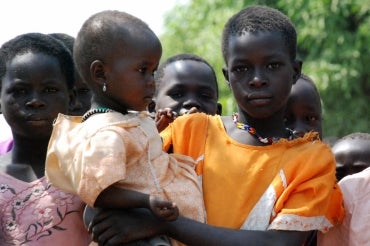Munk School war crime researcher wants to give something in return

Published: May 16, 2016
“Are you afraid we’re going to kill you?”
That was the blunt question that a group of former commanders in the notorious rebel group, the Lord’s Resistance Army (LRA), asked Mark Kersten when he went to Uganda in 2011 for research on the effects of the International Criminal Court’s intervention in the north of the country.
“I remember telling them that I wasn’t worried because they wouldn’t be forgiven for killing a Western researcher,” he told U of T News recently. “It’s sad, but it’s true that despite receiving amnesty from the Ugandan government for atrocities against their own people, they would be punished severely if they killed a researcher from the West. They laughed and said, ‘Yes, that’s true.’”
That was only the beginning of an hours-long conversation with the former commanders, who had been forced to join the LRA as child soldiers. Since they had been amnestied, the ex-soldiers had attracted the attention of other Western researchers, and they were frustrated that previous researchers had interviewed them and then left, never giving anything back in return to the people they interviewed.
That encounter led Kersten, now a research fellow at U of T's Munk School of Global Affairs, to decide to give 200 copies of his upcoming book, Justice in Conflict: The Effects of the International Criminal Court’s Interventions on Ending Wars and Building Peace, to libraries, schools and universities across Africa and ICC-affected countries. The publishers, Oxford University Press, will provide the books, and all of Kersten’s royalties will pay for the shipping and handling costs.
Kersten says he believes that more and more researchers are beginning to realize that they need to give something in return to the places where they conduct research. “My gesture is just a drop in the ocean, but hopefully it will spur some discussion and get others thinking about how to make our work more accessible.”
The book uses case studies from northern Uganda and Libya to analyse the effects of the ICC, which, Kersten says, is suffering from a problem of unrealistic expectations. “When it was originally set up, a lot of people thought the International Criminal Court would change the world – that it would prevent mass atrocities and bring those responsible for atrocities to justice.”
Although it hasn’t fulfilled those expectations, Kersten says the ICC has changed the way that people think about justice and accountability around the world. “The very existence of the court has shifted thinking from whether justice can be done to how and when justice can be done.”

Kersten says his interest in the ICC began when Sudanese president Omar al-Bashir was indicted by the ICC in 2008 for war crimes in Darfur (read Kersten's comments to the Washington Post about Bashir). At the time, he said, there was debate over whether the indictment would help or hinder the prospects for peace in Darfur.
“On the one hand, you had scholars and journalists saying that prosecuting a sitting head of state who was actively involved in a war could undermine any attempt to resolve that conflict peacefully. On the other hand, you had people arguing that you shouldn’t sacrifice justice at the altar of some potential future peace.”
That interest led Kersten to start the Justice in Conflict blog which now has hundreds of entries and receives more than 15,000 visitors each month. And, after teaching at the London School of Economics and SOAS, University of London, Mark’s work has led him back to his native Canada, and to a two-year SSHRC-funded research fellowship at Munk.
“Munk is a terrific place to be based,” he says. “It’s a perfect place to consider issues on international justice, measuring the impacts of criminal justice processes around the world and re-imagining Canada’s role on global justice issues. I’d like to stay longer than just the two years.”
Kersten also hopes to help Canada rehabilitate its global reputation. “It’s clear to me that Canada’s reputation – as it pertains to human rights, atrocity prevention and so on – has suffered a lot over the past 10 years. I wanted to come back and engage with like-minded Canadians on how to resuscitate that reputation and impact.” One way, he suggests, is for Canada to appoint an international justice ambassador. “I think we can envision Canada in a position at the forefront of human rights and global justice. Developing new policies and appointing an international justice ambassador would go a long way in telling the world that Canada really is back.”



